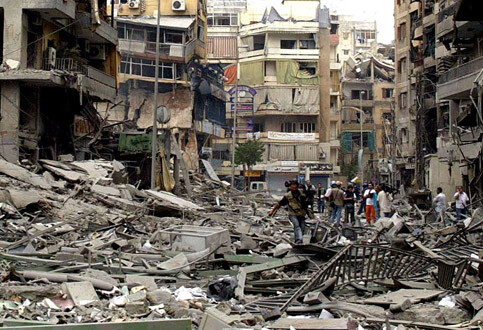IRIN 26 July 2006

Lebanese Red Cross says more civilians may have died. (Haitham Moussawi/IRIN)
TYRE — Members of the Lebanese Red Cross in southern Lebanon say dozens more civilians could have died than accounted for so far, making the civilian death toll higher than official figures.
Kassam Shaalan, of the Lebanese Red Cross in Tyre, told IRIN that in a village near Srifa, in the hills east of Tyre, dozens of people are believed to have been buried in rubble after an Israeli missile destroyed their apartment block.
The victims are presumed dead, but the Red Cross has been unable to reach the building because of safety concerns and no guarantees of safe passage from the Israeli military.
On Sunday, Shaalan and two other members of his crew narrowly survived Israeli missile strikes on two Red Cross ambulances. One ambulance was carrying three wounded Lebanese. They too survived but are in critical condition.
Shaalan says that the strikes came despite requests from the International Committee of the Red Cross (ICRC) to Israel for assurances that Red Cross vehicles would not be attacked, and despite the vehicles being clearly marked as Red Cross.
The Red Cross unit in Tyre now has just four ambulances to serve 57 villages, he says. Across the whole of southern Lebanon, it has 40 ambulances serving what is left of a population of 200,000.
“The assistance we provide is only a drop in the ocean,” says Shaalan, his face bandaged from injuries received in the missile attack. “All the staff here are afraid as we are bombed every day. But I would prefer to die helping people, than die hiding.”
Shalaan says he and others will have little faith in any forthcoming diplomatic agreements to secure ‘humanitarian corridors’ in southern Lebanon.
Despite this scepticism though, the United Nations did manage to secure safe passage from both Israel and Hizbullah militants for its first relief convoy from Beirut to Tyre on Wednesday.
The UN’s Emergency Relief Co-ordinator, Jan Egeland, is trying to get the Israeli government to agree to a longer lasting agreement for humanitarian corridors in southern Lebanon, to allow more relief convoys and aid workers to travel on the roads without the risk of being attacked.
Lebanon’s Higher Relief Council, set up to co-ordinate emergency assistance, said on Wedsnesday that 392 civilians had been killed since Israeli attacks began on 12 July. The identities of almost a quarter of the dead were so far unestablished, it said.
Related Links
This item comes to you via IRIN, a UN humanitarian news and information service, but may not necessarily reflect the views of the United Nations or its agencies. All IRIN material may be reposted or reprinted free-of-charge; refer to the copyright page for conditions of use. IRIN is a project of the UN Office for the Coordination of Humanitarian Affairs.